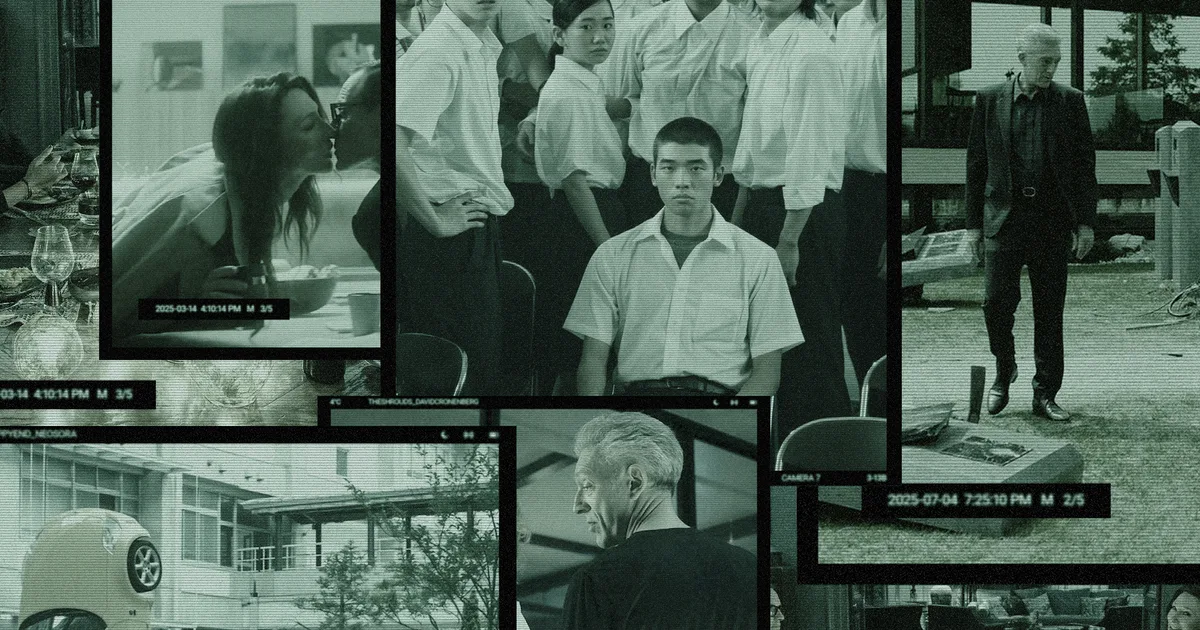
“I can feel when you’re watching me, I like it” is the first line uttered by Kathryn (Cate Blanchett) in a cool seductive tone to her loyal husband George (Michael Fassbender) in Stephen Soderbergh’s spy thriller, Black Bag. The couple are no strangers to surveillance as their vocation in MI5 requires it, but George’s gaze is welcomed due to the innate desire and loyalty within. However, as the film progresses and George’s investigation forces him to question whether his wife is the intelligence leak, his once intimate gaze begins to shift. With the help of Clarissa (Marisa Aribela), George uses satellite footage to watch Kathryn’s covert mission, and so the dynamic changes. Although George insists that their marriage works because he watches her and assumes she watches him, the frisson is no longer between the couple, but instead in the satellite control room between Clarissa and George. While feline seductress Clarissa purrs her words, George takes no pleasure from this task; there is no longer any thrill in being the watcher or the watched.
George and Kathryn’s marriage is not the only bond that strains under the weight of espionage. Every other agent – Clarissa, Freddie (Tom Burke), James (Regé-Jean Page) and even the agency-mandated therapist Zoe (Naomie Harris) – struggles to maintain healthy relationships. Soderbergh’s latest concerns itself with distrustful spies, with the ability to lie about every encounter, but it could easily be a portrait of the London dating scene. In a densely-populated city where everyone has access to dating apps, the possibilities are presumably endless. No one has to choose, and yet according to Moya Lothian-McLean’s detailed report, no one is having a good time.
The feeling of being watched even falls to those who don’t partake in vocational voyeurism (like spy Caul or photographer Jeff). The students of Neo Sora’s Happyend are the subjects of surveillance rather than active participants, as their school has just installed a new CCTV system which identifies and automatically penalises students for breaking school rules. One poignant scene perfectly encapsulates the subconscious effects constant surveillance has on its students. After mopping the floor of the music room clean, Ming (Shina Peng) and Ata-Chan (Yuta Hayashi) find themselves stuck in the corner of the room, at least until the floor dries. They have washed away their past transgressions and are paralysed, afraid to leave footprints on the sanitised school floor, while another pair caught embracing in a stairwell are immediately chided by the camera. Much like today’s younger generations who have no memory of a dial-up modem, the students of Happyend are quickly learning to sacrifice sensual experiences for the value judgement of technology.
Last loves are just as susceptible to surveillance’s lure as first crushes. In Cronenberg’s The Shrouds, no one is surprised that grief-stricken entrepreneur Karsh (Vincent Cassel) is striking out on dates since his wife Becca’s (Diane Kruger) death. Especially when he takes Myrna (Jennifer Dale) to a graveside restaurant and shows her his wife’s decaying corpse through the app he invented on his phone. Karsh has become so accustomed to his new normal, regularly checking on Becca’s decomposing body, that he can no longer comprehend other people’s discomfort around death. His morbid obsession soon takes him to paranoid heights, uncovering a betrayal in his last marriage and so Karsh, with all his tech and intelligence, is right back where Caul started: confirming his paranoias, even at the detriment of himself. Karsh does not end up alone, his money and status prevent that from happening, but even as he finds a new grave partner, this eternally binding contract is ultimately soulless, leaving the viewer hollow.
Big tech’s encroachment into every corner of our lives has made surveillance so ubiquitous that we take on its invasive roles even when we don’t have to, inevitably leading to breakdowns of trust and intimacy in favour of widespread hypervigilance. These latest additions to surveillance cinema all share a sleek, cold touch in their depictions of surveillance technologies, with observation and objective truth prioritised over the messy, chaotic, nuanced human experience of love. From first crushes to grave encounters, this is how disruptive tech has become in our romantic lives. Our active participation in a culture which values information above all else makes us as detached as the algorithms that categorise us. Perhaps in order to find the love and connection many of us feel is missing from our lives, we need to recognise that all this information won’t bring us any closer. Then, we might even be able to kill the CCTV inside our head.
